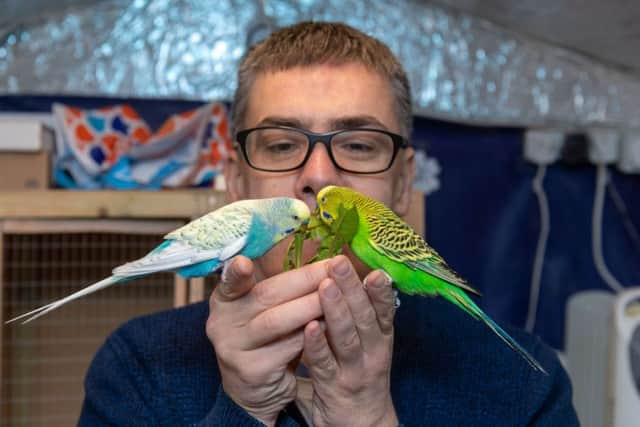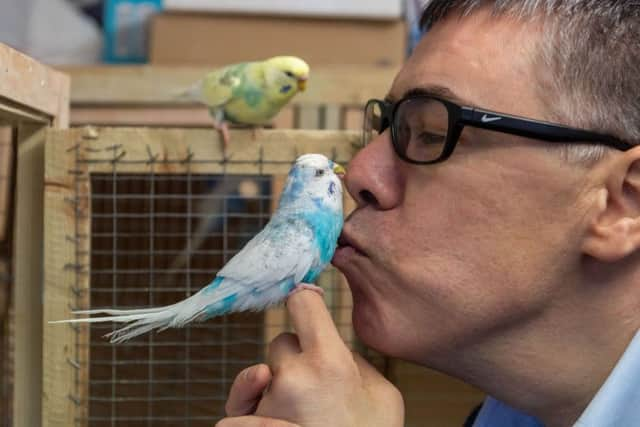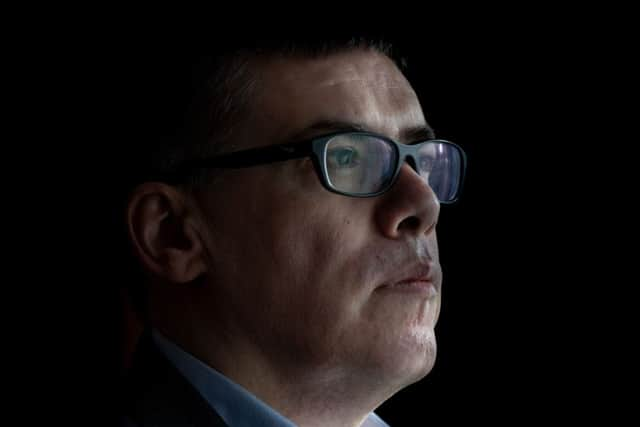From top Syrian diplomat to Barnsley budgie breeder, how life has changed for Khaled al-Ayoubi
The 20 budgies that live in a modified shed in Khaled al-Ayoubi’s garden have brought him colour and comfort through a difficult time. Seven years ago, Khaled was the UK’s top Syrian diplomat.
But after quitting his job over the Syrian regime’s “violent and oppressive acts”, he began a new life in Yorkshire. He now calls the region his home, sharing a property in Barnsley with his wife and children - and, of course, the “micro-world” of his beloved birds.
Advertisement
Hide AdAdvertisement
Hide Ad“They give you love, they give you friendship,” he says. “Those budgies are really like humans. Everyone has a character. Some of them are heroes really, because if you catch another budgie they will come to you and try to help them. And some of them are mean. They are savages and will try to hurt the other budgies. And some of them are funny, some are playful. They have characters like a human exactly.”


One, Jesou, shares a name with Khaled’s first pet budgie, which he got from his cousin whilst studying in Syria in 1992. Able to fly freely around the home, the budgie began to mimic words and soon became notorious among Khaled’s family and friends.
“He was like part of the family,” the 47-year-old recalls. “He was very tame and I think he was the only Syrian budgie who was mimicking or talking. He was talking, dancing and I’ll never forget that bird.”
Advertisement
Hide AdAdvertisement
Hide AdBy the time Jesou died, Khaled, who was born in a Kurdish neighbourhood in Damascus, was working at Syria’s Ministry of Foreign Affairs as a computer technician, having completed a degree at Damascus University’s Engineering Institute.


Here he was exposed to diplomats “and the privilege they had” and, after further study from 1995 to 1999, he became one himself in 2001. Two years later he was posted to Greece, where he remained for half a decade, before returning to Syria.
In 2011, he then began work at the Syrian embassy in London and was made Chargé d’Affaires in June 2012, meaning he was the most senior Syrian diplomat serving in the UK.
The expulsion of his predecessor and two other diplomats had been announced at the end of May, with the Foreign and Commonwealth Office (FCO) saying at the time that the move was an expression of outrage at the Syrian regime’s “repression of its people” and in response to the killing of more than 100 people in el-Houleh. Conflict had erupted in Syria a year earlier and the country descended into a civil war .
Advertisement
Hide AdAdvertisement
Hide AdIn July 2012, less than two months after taking up the top diplomat role, Khaled quit. An FCO statement at the time said he was “no longer willing to represent a regime that has committed such violent and oppressive acts to its own people”, adding it was a blow to Syria President Bashar al-Assad’s regime.


“The Government didn’t understand that using power, using the army against people, wouldn’t solve the problem,” Khaled says. “Part of my job was to defend the Syrian Government policy in Syria and I found it very difficult for me to be part of the game of blood going on in Syria. For myself, in my heart, I wanted Syria to be like the UK. I want people to live in democracy, freedom, equality, transparency.”
“The message that I wanted to send at that time was that I can’t support killing in Syria,” he adds. It wasn’t an easy decision - it meant losing everything he had achieved, his job, his property, his fortune.
“At that time not many diplomats had defected. I was one of the first diplomats and I was afraid. I was scared,” he says. Fearing he would be killed if he returned to Syria, Khaled sought asylum to stay in the UK as a refugee. “In London, it wasn’t safe for me because they [the Syrian regime] know where I am... it’s really quite dangerous,” he says. Instead, he was transferred to Barnsley.
Advertisement
Hide AdAdvertisement
Hide Ad“It’s like our new home here,” he says. He lives with his wife Suheir - a factory worker, 13-year-old son Yanal and 17-year-old daughter Tala who is applying to study medicine at university and says the town has been welcoming.
“In Syria, we have this habit where you look at your neighbourhood, sometimes if you have some food or fruit from your garden, they give it to you and you give it to them. It’s like Syria here [in that sense] because all my neighbours are gardeners.
“They have given me lots of tips and now we have a great garden with their help also. They give me their products, I give them my fruit and one of my neighbours has an allotment and some chickens and every few days, few weeks, he gives me some eggs.
“You can’t imagine, when you are a stranger fearing and you are afraid, exposed, vulnerable, to have those people around you. I love Barnsley. I love the people of Barnsley. They are great people here.”
Advertisement
Hide AdAdvertisement
Hide AdKhaled’s work meant it was difficult for him to own pets after Jesou, but when he moved to Barnsley, he bought four budgies - and then another two and studied how to breed them. Now Jesou, Creamina, Disco, T-Rex and Rainbow are among the 20 birds he has reared and hand-fed.
He spends hours with them - and his other birds, a parrot and cockatiel - everyday, likening them to children, and they have helped him to adjust to his new life in the UK. “We were alone here. The only community for me was my good neighbours around me. I see them, sometimes drink coffee or beer with them but this is only half an hour, no more, so I sit alone for a long time.”
The budgies provided a new focus for Khaled, a way to fill his time and achieve something and a form of companionship. “They are really good friends,” he says. His birds also feature on his Youtube Channel Happy Parrots where he shares videos of them hand-feeding and bathing to thousands of viewers. In the latest, uploaded last week, he tells those watching about two of his budgies who have bred without a nesting box - it seems more budgies could be hatching soon “without my consent,” he jokes.
Today, Khaled’s time is split between caring for the birds and volunteering with the Refugee Council, in Barnsley, which has supported his family. He wanted to help others like him, starting a new life in the country, and tells of those he has met fleeing from the horrors of slavery and human trafficking.
Advertisement
Hide AdAdvertisement
Hide AdNow settled in the UK, Khaled plans to apply for citizenship to get a British passport. It will help him to “feel safer, feel like you’ve got a home now”, he says, and is hopeful too that it will help him to find a job - one of the biggest challenges he has faced since starting his new life.
He may never see his home country again but dreams that one day he will go back. “Maybe in the future, we will find a solution, save lives, stop bloodshed and we can go back home and start a new life, living effectively like the UK but in Syria. This is the future I’m dreaming of everyday. I hope one day I will see it.”